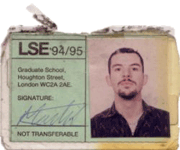 My, how times have changed!
My, how times have changed!It's a simple question spilling from the lips of over four million former graduates. "If I've got extra cash, should I pay off my student loan?"
The answer depends on whether you've other debts and when you studied, as that dictates whether your interest rate for the 2012/13 academic year is 1.5% or 3.6%.
This easy-to-follow guide will speedily take you through how to work out your situation, how you're affected and answer the key 'should I pay it off?' question. Plus our unique student loan repay calculator will show you how long it'll take you to repay.
What you need to know
Quick Links:
| Tweet | mse.me/repay |
This guide only covers official Student Loans Company (SLC) loans, not Personal, Career Development or professional studies loans (for those see Pay Off Debts With Savings?.
Step 1: Check YOUR student loan type
 A whole generation of Brits now have student loans. Anyone who started higher education since 1990 has been eligible - so even those who graduated 20 years ago could still have them.
A whole generation of Brits now have student loans. Anyone who started higher education since 1990 has been eligible - so even those who graduated 20 years ago could still have them.
Sadly many of these four million people have had little, if any, education on these matters - for loads more info on how this can be rectified, see the full Financial Education Campaign section.
The way student loans work varies radically depending on WHEN you started higher education.
Click tab for info about your loan type
Who has them? Those who started higher education between the years of 1998 and 2011
Loan type: New style "income-contigent"
Current interest Rate: 1.5% (From September 2013, the interest rate is likely to be 1.5% - see the student loans news story for why this is not definite).
The interest rate for the year starting 1 September 2012 is 1.5%, based on the Bank of England base rate (0.5%) plus 1%. (If you're new to interest rates see our Interest Rates Beginners Guide)
How the interest rate is set: The interest rate is set as the LOWER of the following:
Either... the Bank of England base rate, plus 1%
Or... the rate of inflation. This is fixed for a year on 1 September based on the rate of inflation (RPI measure) the previous March, though the actual rate is only officially confirmed each August.
Therefore for the year starting 1 September 2012, base rate (0.5%) + 1%, ie, 1.5%. If base rate changes dramatically, this can rise, up to a maximum of 3.6% (the rate of RPI in March 2012).
Number of outstanding loans:4,000,000 (at April 2012)
How much will you repay? You repay 9% of everything earned above �15,795 a year. Before April 2012 this was �15,000. So earn �17,000 and you'll repay �109 a year; earn �30,000 and it's �1,280 a year.
If your earn under the threshold but a bonus or over-time earnings pushes you over the �1,315 monthly limit, a repayment WILL be deducted that month. You can claim it back from SLC at the end of the tax year if your P60 shows total earnings were under �15,795. From April 2013, this will rise by 3.6% to �16,365.
How you actually pay it: 
For employees: The money is taken automatically from the payroll like tax (so it never goes in your pocket and there are no debt collectors).
If your salary's over �15,795 and repayments aren't being deducted, it's YOUR responsibility to tell your employer. Keep evidence of doing this as, if it doesn't start deducting repayments after you've asked, the possible fine of �1,000s will be your employer's to pay.
Repayments are given to HM Revenue & Customs, which then pays the Student Loans Company (SLC) every March. SLC applies repayments as if it had received them monthly, so you don't pay more interest than necessary (but it doesn't look like that throughout the year).
For the self-employed/ those with other income: If you are self-employed, you are responsible for notifying HMRC of payments when you do your self-assessment form.
If you have additional income of �2,000+ from savings interest, pensions or shares and dividends, then this will also be treated as part of your income for repayment purposes and you'll need to repay 9% of that, again via self-assessment.
Have you nearly paid the loan off? If so, give the SLC a call on 0845 0738 891 - or it may continue taking payments past the point that you have cleared the debts. This is because it only assesses your balance once a year, each March.
If you are nearing full repayment, you have the option to leave the PAYE scheme and make monthly payments by direct debit instead. For full details on this, and how to get money back if you've already overpaid, read MSE News: �22m in student loan overpayments.
The impact on credit files: None whatsoever. This type of student loan is not included on credit files. However, when applying for a product you may be asked whether you have loans. Plus the fact your take-home pay is reduced may be taken into account (see the Credit Rating guide too).
Can I defer payment? No - but you only repay if you are earning above �16,365.
How to overpay: You can make a payment any time you wish, by card, cheque or bank transfer. See the Student Loans Company payments page for details.
Any changes due? In general, no. The 2012 changes ONLY affect new starters - you will remain on the current system.
However those on 'post-1998' loans will see their repayment threshold (how much you need to earn before you start paying) increase with inflation annually from April 2012 to April 2016 (based on the RPI inflation rate in the March the year before).
This means you will pay LESS back each year, extending the loan's life and potentially the total cost - but giving you more disposable income.
SLC have said the increases are likely to be by RPI in future years too until 2015, when a further decision will be made.
Who has them? Those who started higher education between 1990 and 1997.
Loan type: Old style "Mortgage" type
Current interest rate: 3.6% (From September 2013, the interest rate is likely to be 3.3% - see the student loans news story for why this is not definite).
How the interest rate is set: It is set for a year every September based on the rate of RPI inflation the previous March - though the actual rate is only officially confirmed each August. (If you're new to interest rates see our Interest Rates Beginners Guide).
Number of outstanding loans:320,000(at April 2012)
How you repay: You must make repayments if you earn over �27,813 - though you can pay before that, if you wish to.
When you start repaying, the amount owed is divided into 60 monthly repayments (or 84 if you took out more than five loans). If you owed �5,000, you would pay �83 a month (�5,000 divided by 60).
How you actually pay it: You are responsible for paying it directly to the Student Loans Company, by direct debit, card, or cheque. See full details on Student Loans Company payment page. 
The impact on credit files:While having the loan itself doesn't impact your score, it can have a substantial impact if you're a late payer or miss a repayment.
The Student Loans Company will write to all late payers, giving 28 days to make contact or it will go on your credit file (see the Credit Rating guide).
Can I defer payment? Yes, if you earn under �27,813. You need to write to SLC once a year to do so, supplying particular documents - see Student Loans Company for full details.
Are there any penalties for repaying early/overpaying? No
How to overpay: You can make an extra payment any time you wish, by card, cheque or bank transfer. See the Student Loans Company payments page for details.
Any changes due? No. Much like when the 1998 changes happened, the system you are on won't change.
IMPORTANT!
These loans haven't started to be repaid yet, the information below is for comparison only. This article primarily caters for past graduates not future students. For that, please read:
Student Finance 2012: The facts not the myths.
Who has them? First year undergraduates. They apply to those who started higher education in 2012 or who'll be at uni in the future.
Loan type: New Style "Income Contigent" Type

Interest rate from Sep 2012: 6.6% (March's RPI + 3% ) (From September 2013, the interest rate is likely to be 6.3% - see the student loans news story for why this is not definite.)
How the interest rate will be set: The amount you pay is based on the rate of inflation. The rate for a year is fixed for a year on 1 September based on the inflation rate (RPI measure) in the previous March.
The rate charged is as follows.
From study's start until the April following graduation (for full-time students):
The rate is that year's inflation rate + 3%. March 2012's inflation rate was 3.6%.
From the April following graduation:
The rate charged is that year's inflation rate if you earn under �21,000, rising gradually to the maximum 'inflation plus 3%' if you earn �41,000 or above.
Number of outstanding loans: c. 300,000
How you repay: In the April following graduation, it's confirmed that students from England and Wales will have to repay 9% of everything earned above �21,000 a year. So earn �22,000 and you'll repay �90 a year; earn �36,000 and it's �1,350 a year.
Scottish and Northern Irish students have not yet had their repayment thresholds confirmed.
The �21,000 threshold will start to rise with UK average earnings from 2017 (the year after full time 2012 starters begin to repay).
How you actually pay it:
For employees: The money is taken automatically from the payroll like tax (so it never goes in your pocket and there are no debt collectors).
Each repayment is given to HM Revenue & Customs (HMRC), which passes the cash to the Student Loans Company (SLC) every March. At this point, SLC applies the repayments as if it had received them on a monthly basis, before interest is calculated, so borrowers don't lose out (though it doesn't look like that to you throughout the year).
If you earn over �21,000 a year and repayments aren't being deducted, it's YOUR responsibility to inform your employer. Ensure you keep evidence of having done this as, if it doesn't start deducting repayments after you've asked, it can be fined up to �1,000s by HMRC - instead of you getting in trouble.
For the self-employed/ those with other income: If you are self employed you are responsible for notifying HMRC of payments when you do your self-assessment form.
If you have additional income of �2,000+ from savings interest, pensions or shares and dividends, then this will also be treated as part of your income for repayment purposes and you'll need to repay 9% of that too via self-assessment (not 100% confirmed yet).
What's the impact on credit files? None whatsoever. Your type of student loans are not included on your credit file. However when applying for a product you may be asked whether you have loans, plus the fact your take home pay is reduced may be taken into account (see the Credit Rating guide).
For more on the impact of 2012 loans on credit and ability to get a mortgage see the Student Loans 2012 guide.
Can I defer payment? No, but you only repay if you are earning above the threshold (�21,000 in April 2016).
Are there any penalties for repaying early/overpaying? There were initial concerns that early repayments may be banned and/or attract penalties. Yet in February 2012 it was confirmed penalty free repayments will be possible. See the MSE News story.
Any changes due? N/A
Don't miss out on updates to this guide Get MoneySavingExpert's free, spam-free weekly email full of guides & loopholes
Step 2: Why student loans are different
There are three key facts that make student loans unlike any other form of borrowing. Without understanding these, you can't make a rational decision.
They have no 'real cost' of borrowing
This is something often said, but it's worth thinking about what it really means. This applies to both pre-1998 and post-1998 loans, but sadly NOT new starters from 2012 onwards (see student finance 2012 for more on that).
There's no 'real' interest cost because the most you'll pay is the rate of inflation - the rate which prices are rising.
Inflation is the rate at which prices rise. Therefore if, as is usual, inflation is positive, then something costing �100 this year will on average cost more next year. For example, at 4% inflation it will cost �104 next year. Now look at the impact of this on the loan:
Why Irma Scholar pays no real interest
New student Irma Scholar needs a �1,000 student loan, enough to buy her 20 trips to the supermarket. The loan interest rate is set at the rate of inflation, which over the next ten years averages 4%. To help keep this example simple, Irma decides to repay it all at once in 10 years' time, having never repaid a penny before.
The 4% annual increases mean she must pay back �1,480. This sounds like it's expensive, yet everything else has gone up by the same proportion too; wages and the price of goods. So in ten years time �1,480 still buys Irma roughly the same 20 supermarket trips' worth of goods.
In other words, the borrowing hasn't diminished her spending power. She borrowed 20 shopping baskets' worth and repaid 20 shopping baskets' worth.This is completely different to all other forms of commerical borrowing, where not only do you pay back the '20 trips to the supermarket', but also actual cash on top - and over the years the amount of extra cash you pay can add up to �1,000s.
In fact for some student loan borrowers, the actual amount owed has SHRUNK in the past due to negative inflation (see the current and past student loans interest rates)
Current and past student loan interest rates Loan type Date Rate Post-1998 loans 1 Sep 12 to 31 Aug 13 1.5%
(unless base rate moves)Pre-1998 loans 1 Sep 12 to 31 Aug 13 3.6% Post-1998 loans 1 Sep 11 to 31 Aug 12 1.5%
(unless base rate moves)Pre-1998 loans 1 Sep 11 to 31 Aug 12 5.3% Post-1998 loans 1 Sep 10 to 31 Aug 11 1.5% Pre-1998 loans 1 Sep 10 to 31 Aug 11 4.4% Post-1998 loans 1 Sep 09 to 31 Aug 10 0% Pre-1998 loans 1 Sep 09 to 31 Aug 10 -0.4% Post-1998 loans 6 Mar 09 to 31 Aug 09 1.5% Post-1998 loans 6 Feb 09 to 5 Mar 09 2.0% Post-1998 loans 9 Jan 09 to 5 Feb 09 2.5% Post-1998 loans 5 Dec 08 to 8 Jan 09 3.0% Post-1998 loans 1 Sep 08 to 4 Dec 08 3.8% Pre-1998 loans 1 Sep 08 to 31 Aug 09 3.8% All loans 1 Sep 07 to 31 Aug 08 4.8% All loans 1 Sep 06 to 31 Aug 07 2.4% All loans 1 Sep 05 to 31 Aug 06 3.2% Of course the system isn't perfect, as inflation moves throughout the year but your repayment rate is fixed annually - yet over time this balances out.
-

If you don't earn enough, you don't need to repay
Unlike normal borrowing, which requires payment regardless of your situation, with student loans you don't need to repay them unless you're earning over a set amount. This applies even if you have started paying and then your income drops.
This is crucial for deciding whether to repay. Firstly, it means if times get tough - you lose your job or your income drops - then unlike any other lenders, the student loan company won't come knocking on your door. You quite simply don't need to repay.
Plus while it may feel like interest is being added if you stop repaying and you see the amount you owe increase, there is no 'real' impact on your pocket because it is set at the rate of inflation.Find out what happens if you move abroad
You have a contractual relationship with the UK Government (via SLC) to repay your student loan. If at any time you move abroad, you're expected to inform the SLC so you can make repayments directly to it (usually by direct debit).
Different repayment thresholds apply in different countries, depending on their national average earnings and typical living costs, so you must provide details of your new salary (see the SLC website's country by country details).Repayments will be deducted in pounds sterling and you'll be responsible for any costs involved in converting the currency.
There are severe penalties if you move overseas and don't tell the SLC, or don't provide the information it requests in order to deduct repayments from your salary. Penalties include applying repayments based on an income equal to twice the UK average earnings, and even - in the most extreme cases - demanding you repay the total loan in one go.
Of course for those in some jurisdictions there are questions of how this will be enforced, but that issue is similar to any cross-border contract. -
The debt is wiped after 25 years (ish) or if you die
Student loans only have a fixed life, though the exact time depends on which loan you have (see chart below). It's also important to note that if you die the debt is wiped. While this may seem obvious, unlike other forms of debts, it means it doesn't form part of your estate (ie, isn't passed on to dependants). The same is true if you become permanently unfit to work.
This is an important fact to consider in your deliberations. It means there is a chance that after you overpay, you may then stop earning over the threshold, die or be incapacitated, so will have unnecessarily repaid debt that you didn't need to. While hopefully this is unlikely for most, it is worth considering.
Equally, if it's unlikely you'll clear the loan in time (see the Student Loans Calculator) then you will have paid unnecessarily.The chart below shows you exactly when your loan would be wiped...
When are outstanding loans wiped? Higher education start date Age at which loan is wiped Death Unfitness to work 1990 - 1997
(If aged under 40)
Earlier of 25 years after repayments were due to start, or when you reach age 50 

1990 - 1997
(If aged 40+)When you reach age 60 

1998 - 2005 When you reach age 65 

2006 - 2011 25 years from the first April of graduation (when you were first due to repay) 

2006 - 2011
(Scottish residents)35 years from the first April of graduation (when you were first due to repay) 

2012 - England & Wales: 30 years from the first April after graduation (when you were first due to repay) Scotland & NI: Not confirmed yet 

Don't miss out on updates to this guide Get MoneySavingExpert's free, spam-free weekly email full of guides & loopholes
Step 3: Pay off other debts first
There is a golden rule for anyone with multiple debts
Always focus on paying off the highest interest rate debts first.
The reason for this is simple. The higher the interest the quicker the debt grows, so you want to get rid of it as soon as possible (see the Pay Off Debts With Savings and Should I Pay Off My Mortgage? guides for a full explanation).
With student loan interest rates at either 1.5% or 3.6%, it's extremely unlikely most other debts - whether credit cards, loans or hire puchase - are costing you less, so always pay those off before even contemplating touching your student loan.
The exceptions
Of course there will be some out there saying "yes but...". So let's briefly run through the J-Los here (the big buts).
There are penalties for overpaying my loan / mortgage
With some loans there may be early redemption penalties for clearing debts early - this can mean they are prohibitively expensive to clear. In that case if you have spare cash and only these debts, you shold follow the logic of someone who is debt-free.
However if the penalties only last for a short time (as with a mortgage) then it is worth considering putting the money aside for the short term in savings until you can clear these debts without paying a penalty.
I have a 0% credit card / a very low tracker rate mortgage
Here your interest rate is lower than the student loan rate - so on pure maths you should clear the student loan ahead of these.
Yet with 0% credit cards, after a time the rate shoots up unless you do a balance transfer so the advantage is only short term unless you have a very good credit score. With tracker mortgages, there is no guarantee the base rate will stay low for a long time.
So if the debt is likely to last over the longer term, when rates could jump, a student loan is likely to be a safer bet to remain relatively cheap). Plus it has the added bonus that if your income were to drop severely, you'd still have to find the money to meet card, loan or mortgage debts, but not your student loan. So it's a fine balance.
Step 4: Debt-free - better to repay than save?
Many students with spare cash who can afford to clear the debt or overpay ask this question,  but in short for most students with post-1998 loans the answer is....
but in short for most students with post-1998 loans the answer is....
No, No and No!
Surprisingly, many bright graduates say, "it's not costing me much, so I'm going to pay it off". This logic's topsy-turvy.
A loan this cheap shouldn't be paid off more quickly than is necessary for two reasons.
Reason 1:
You can earn more saving than the loan costs.
Quite simply for post-98 loan holders, the interest you can earn in a top savings account (just) outstrips the cost of student loans for basic rate tax payers. So you're slightly better off saving any excess cash you've got rather than repaying the debt. Here's an example...
Recent graduate Ivor Gudjob has �10,000 of student loan debt, now at 1.5%. He's debt free and has �5,000 saved up. His choices are putting the money towards his loan, or saving it in a top cash ISA at 2.5% tax-free.
Easy calculations show that repaying the loan saves him �75 a year but saving earns him �125 a year so he's �50 better off. It's a no-brainer!
In fact the equation is quite simple - if you can EARN more from savings (after tax) than the loan is costing you, then you're better off saving.
| Rate savings must pay to beat repaying student loan | ||||
|---|---|---|---|---|
| Tax-free savings | Taxed savings (basic 20% rate taxpayer) |
Taxed savings (higher 40% rate taxpayer) |
Taxed savings (top 45% rate taxpayer) |
|
| Post 1998 loan (1.5%) | 1.5% | 1.88% | 2.5% | 3% |
| Pre 1998 loan (3.6%) | 3.6% | 4.5% | 6% | 7.2% |
As the table shows, for post-1998 loans, even with current low savings rates, some accounts still beat paying off student loans (see Top Cash ISAs or Top Savings for details). Though it is worth remembering that if interest rates went up this year, so could the student loan rate. If that worries you, ensure savings have easy access, so you are free to repay it at any time.
Although rates have dropped to 3.6% the situation is still different for graduates with pre-1998 loans. At current savings rates, taxpayers can't easily outdo the student loan interest rate (though it may be possible again in future years) without fixing in a long term ISA. So, you may want to consider simply bunging any spare cash at it, but read reason 2 first.
Reason 2:
Avoid having to borrow back at higher rates
For ALL loan holders, there is an incredibly important additional reason...
By paying it off early, you risk needing more expensive borrowing from elsewhere later
You might have no debts right now. But it's possible you will have in the future, perhaps as a mortgage, for a car or to set up a new business.
By paying off your student loan quicker than necessary, rather than saving, you may find yourself replacing it in a few months or years with a much more expensive commercial loan. After all, even a mortgage over the long run costs more than a student loan. Plus student loan debt has the safety that it needn't be repaid if your income drops.
Student loan debt doesn't cost anywhere near as much as commercial interest. If future borrowing's likely, consider building up your savings now, rather than speeding up student loan repayments, so that you need to borrow less from the bank in the future.
Those with no self-control, be careful
Yet for those who've been badly burned by debt, or have no self-control, sometimes it's best to ignore the sums and do what you feel comfortable with. If you'll just end up spending or wasting the cash, then at least overpaying the student loan is playing it safe. It's far better than ignoring the fact you've no self control or frivolously building up more borrowing.
Student Loan Calculator: How long will it take to repay?
First, you need to know how much you owe. You can view your balance online to find the amount up to the last March. If you've any problems, call the Student Loans customer support centre on 0845 026 2019 to get the log-in details sent to you (bookmark this page to return to).
If you've made any repayments through payroll since the end of March, subtract those to get a more accurate figure (any voluntary repayments will have been deducted straight away).
Should you wish to, post-1998 student loan holders can also pay off any amount by phone or online using their card details. You'll need your student loan reference number to do this.
Tool gives rough estimate for students who started uni in or after 1998
 Shell �20 of petrol for �10
Shell �20 of petrol for �10 Burger King 2for1 & more
Burger King 2for1 & more Domino's 2for1 for �1
Domino's 2for1 for �1








